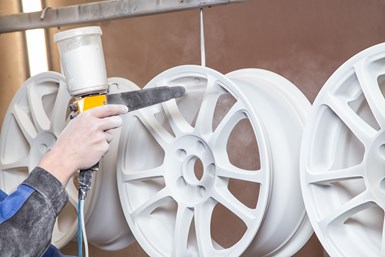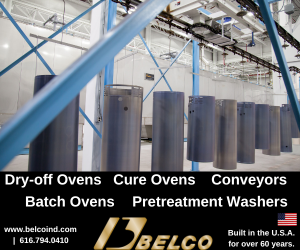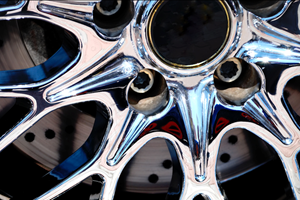Calculating the Cost of Powder Coating
How can you calculate the cost of powder coating a component if you only know its surface area? Powder coating expert Rodger Talbert has the answer.
Q. How can we calculate powder coating cost on any component with only the surface area known?

A. Calculating the coating cost of a particular part starts with gathering the variables associated with that part. What is the part size, how many of them can you fit into your coating process per hour and how much surface area will be coated?
This process data is used to determine the parts per hour so that the hourly costs can be broken down into a cost per part. The number of pieces per rack, racking centers and line speed can be used to determine the production volume per hour at 100-percent efficiency. This number should be adjusted to compensate for breaks or other factors that reduce the line efficiency.
The items that will contribute to cost are material, labor, variable burden, fixed cost and scrap cost.
Labor should be calculated per hour and then broken down into the production volume to determine a cost per part. The hourly wage of all spray operators, rackers, supervisors, quality workers and other people that contribute direct labor to the line should be totaled up per hour and then divided into the production rate to determine the cost per part of labor.
Variable labor (burden) should be added based on the extras that the company provides in addition to the hourly straight wage. This would include insurance, uniforms, training, taxes, etc. This is added to the direct labor and then divided out per part based on the production rate.
Every coating operation has a fixed cost that must be paid regardless of the rate of production. This includes building rent, debt, administration, maintenance and services that support the coating operation. This hourly fixed cost should be divided into the production rate to determine the cost per part.
Some parts need rework and some need to be scrapped. The rework cost and scrap cost need to be totaled and divided into the production rate to determine the cost added for scrap.
Example for Mini-Van Door Slide
Process Data:
- 1.5 million pairs/year
- 3 million parts/year
- 1,500 parts/hour
- 3 million parts ÷ 250 work days = 12,000 parts/day
- 12,000 parts ÷ 8/day = 1,500 parts/hour
- Surface area per part = 1.7 ft.2
- Powder cost per pound = $3.50
A pound of powder with a specific gravity of 1.0 at 100-percent utilization will cover 192.3 ft.2 at a thickness of 1 mil. That is the starting point for calculating the powder cost.
- 192.3 × 0.90 material utilization with reclaim ÷ 2 mils thickness × 1.4 specific gravity = ft.2/lb.
- 173 ÷ 2.8 = 61.8 ft.2/lb.
- 61.8 ft.2/lb. ÷ 1.7 ft.2/part = 36.4 parts/lb.
- $3.50 (cost per pound) ÷ 36.4 parts/lb. = $0.096 + $0.03 (add for rack losses) = $0.099/part
Labor cost looks at the number of workers and total wages:
- Average wage per hour with benefits: $15
- Number of people to staff system: 13
- Total wages: $15 × 13 = $195/hour
- 195/hour ÷ 1,500 parts/hour = $0.13/part
Variable line burden is added to the total labor cost:
- System utilities $50/hour
- Packaging $20/hour
- Supplies $15/hour
- Total $85/hour
- 85/hour ÷ 1,500 parts/hour = $0.06/part
Fixed costs are the building, debt, administration, etc. A typical amount might be around $600/hour:
- $600/hour ÷ 1,500 parts per hour = $0.40/part
Total Cost
- Material $0.10
- Labor $0.13
- Burden $0.06
- Fixed cost $0.40
- Total cost per piece $0.69
This type of formula can be set up in a spread sheet for quoting purposes. When the process data is filled in, the spread sheet does the work for you.
Originally published in the August 2017 issue.
Related Content
How to Maximize Nickel Plating Performance
The advantages of boric acid-free nickel plating include allowing manufacturers who utilize nickel plating to keep up the ever-changing regulatory policies and support sustainability efforts.
Read MoreA Chromium Plating Overview
An overview of decorative and hard chromium electroplating processes.
Read MoreHow to Choose Between Sulfate and Chloride-Based Trivalent Chromium
There are several factors to consider when choosing between sulfate and chloride-based baths for trivalent chromium plating. Mark Schario of Columbia Chemical discusses the differences and what platers should keep in mind when evaluating options.
Read MoreTop Reasons to Switch to a Better Cleaning Fluid
Venesia Hurtubise from MicroCare says switching to the new modern cleaning fluids will have a positive impact on your cleaning process.
Read MoreRead Next
A ‘Clean’ Agenda Offers Unique Presentations in Chicago
The 2024 Parts Cleaning Conference, co-located with the International Manufacturing Technology Show, includes presentations by several speakers who are new to the conference and topics that have not been covered in past editions of this event.
Read MoreDelivering Increased Benefits to Greenhouse Films
Baystar's Borstar technology is helping customers deliver better, more reliable production methods to greenhouse agriculture.
Read MoreEpisode 45: An Interview with Chandler Mancuso, MacDermid Envio Solutions
Chandler Mancuso, technical director with MacDermid Envio discusses updating your wastewater treatment system and implementing materials recycling solutions to increase efficiencies, control costs and reduce environmental impact.
Read More













.jpg;maxWidth=300;quality=90)








